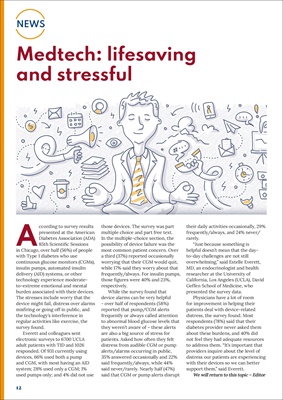
12
NEWS
Medtech: lifesaving
and stressful
According to survey results
presented at the American
Diabetes Association (ADA)
85th Scientific Sessions
in Chicago, over half (56%) of people
with Type 1 diabetes who use
continuous glucose monitors (CGMs),
insulin pumps, automated insulin
delivery (AID) systems, or other
technology experience moderateto-extreme
emotional and mental
burden associated with their devices.
The stresses include worry that the
device might fail, distress over alarms
misfiring or going off in public, and
the technology's interference in
regular activities like exercise, the
survey found.
Everett and colleagues sent
electronic surveys to 6700 UCLA
adult patients with T1D and 1026
responded. Of 931 currently using
devices, 66% used both a pump
and CGM, with most having an AID
system; 28% used only a CGM; 1%
used pumps only; and 4% did not use
those devices. The survey was part
multiple choice and part free text.
In the multiple-choice section, the
possibility of device failure was the
most common patient concern. Over
a third (37%) reported occasionally
worrying that their CGM would quit,
while 17% said they worry about that
frequently/always. For insulin pumps,
those figures were 40% and 23%,
respectively.
While the survey found that
device alarms can be very helpful
- over half of respondents (58%)
reported that pump/CGM alerts
frequently or always called attention
to abnormal blood glucose levels that
they weren't aware of - these alerts
are also a big source of stress for
patients. Asked how often they felt
distress from audible CGM or pump
alerts/alarms occurring in public,
35% answered occasionally and 22%
said frequently/always, while 44%
said never/rarely. Nearly half (47%)
said that CGM or pump alerts disrupt
their daily activities occasionally, 29%
frequently/always, and 24% never/
rarely.
"Just because something is
helpful doesn't mean that the dayto-day
challenges are not still
overwhelming," said Estelle Everett,
MD, an endocrinologist and health
researcher at the University of
California, Los Angeles (UCLA), David
Geffen School of Medicine, who
presented the survey data.
Physicians have a lot of room
for improvement in helping their
patients deal with device-related
distress, the survey found. Most
respondents (78%) said that their
diabetes provider never asked them
about these burdens, and 40% did
not feel they had adequate resources
to address them. "It's important that
providers inquire about the level of
distress our patients are experiencing
with their devices so we can better
support them," said Everett.